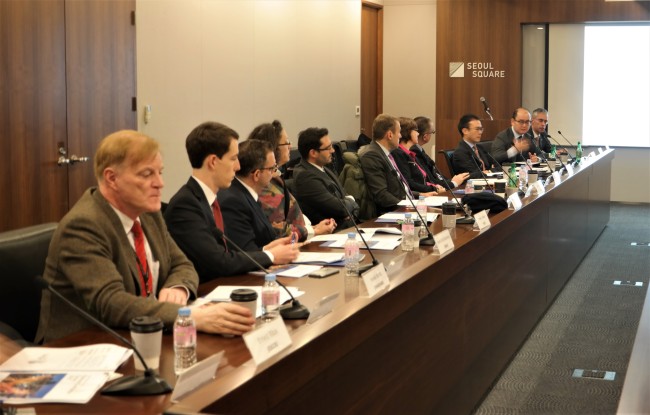European businesses in South Korea are increasingly voicing negative feedback regarding the business environment here, a survey by the European Chamber of Commerce in Korea showed Tuesday.
Of the 131 European executives polled, 60 percent said business in Korea has become more difficult, compared to 52 percent in 2014 and 2015. Eleven percent responded that business has become easier.
The ECCK is a nonprofit, non-political organization of European companies operating in or related to Korea. Its annual Business Confidence Survey was conducted from Nov. 13 to Dec. 2 last year, in a joint project with Roland Berger, a German consulting firm. It received feedback from 131 company executives. The survey pool represents roughly 60,000 employees in Korea with a turnover of approximately $53.1 billion (62.6 trillion won).
When asked how they would characterize the importance of Korea in their companies’ overall global strategy, 37 percent responded with “increasing importance,” down from 51 percent in 2014 and 44 percent in 2015. Last year, 16 percent characterized Korea as declining in importance, a 6 percent jump from the previous year.
 |
Members of the European Chamber of Commerce in Korea speak to the press at a press conference held at the Seoul Square building on Tuesday. (ECCK) |
The unfavorable responses are largely attributed to the country’s ongoing political scandals involving the current administration and chaebol as well as disputes over public procurement policies.
“Basically, the current political turmoil has overtaken all uncertainties, not just in EU companies, but in Korean companies as well,” said Lee Soo-sung, managing partner at Roland Berger.
“This losing trust issue is important to everybody right now. The overall result of this survey, I can say it has been impacted by the overall turmoil of our political situation.”
In terms of labor costs, the survey showed the automotive, financial services and energy/chemicals industries to be the most pessimistic about business outlook in Korea in the next two years. The automotive industry saw 60.9 percent of participants stating they were “partially pessimistic,” while 17.4 said they were “highly pessimistic.”
The discretionary enforcement of regulations and unpredictable legislative environment are also widely considered to be some of the major obstacles for European companies doing business in Korea, according to the ECCK survey.
Of the respondents, 57 percent named discretionary enforcement of regulations as either partially or highly significant, while half of the companies cited the unpredictable legislative environment as partially or highly significant.
“Particularly with foreign companies, not only European companies, there’s discrimination with the enforcement of rules. That’s something we have to improve,” Lee said.
However, despite the overall negative views in terms of the nation’s business environment and protectionism laws, 61.8 percent of the companies stated they were “content” or “very content” with their performance in Korea. Half of them also said they were planning to expand their operations in Korea this year in pursuit of organic growth.
By Julie Jackson (
juliejackson@heraldcorp.com)








![[Today’s K-pop] Blackpink’s Jennie, Lisa invited to Coachella as solo acts](http://res.heraldm.com/phpwas/restmb_idxmake.php?idx=644&simg=/content/image/2024/11/21/20241121050099_0.jpg)